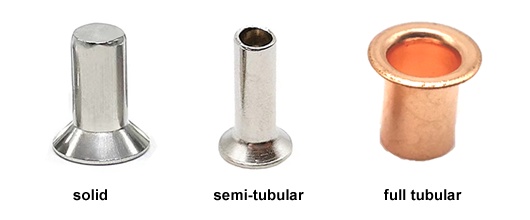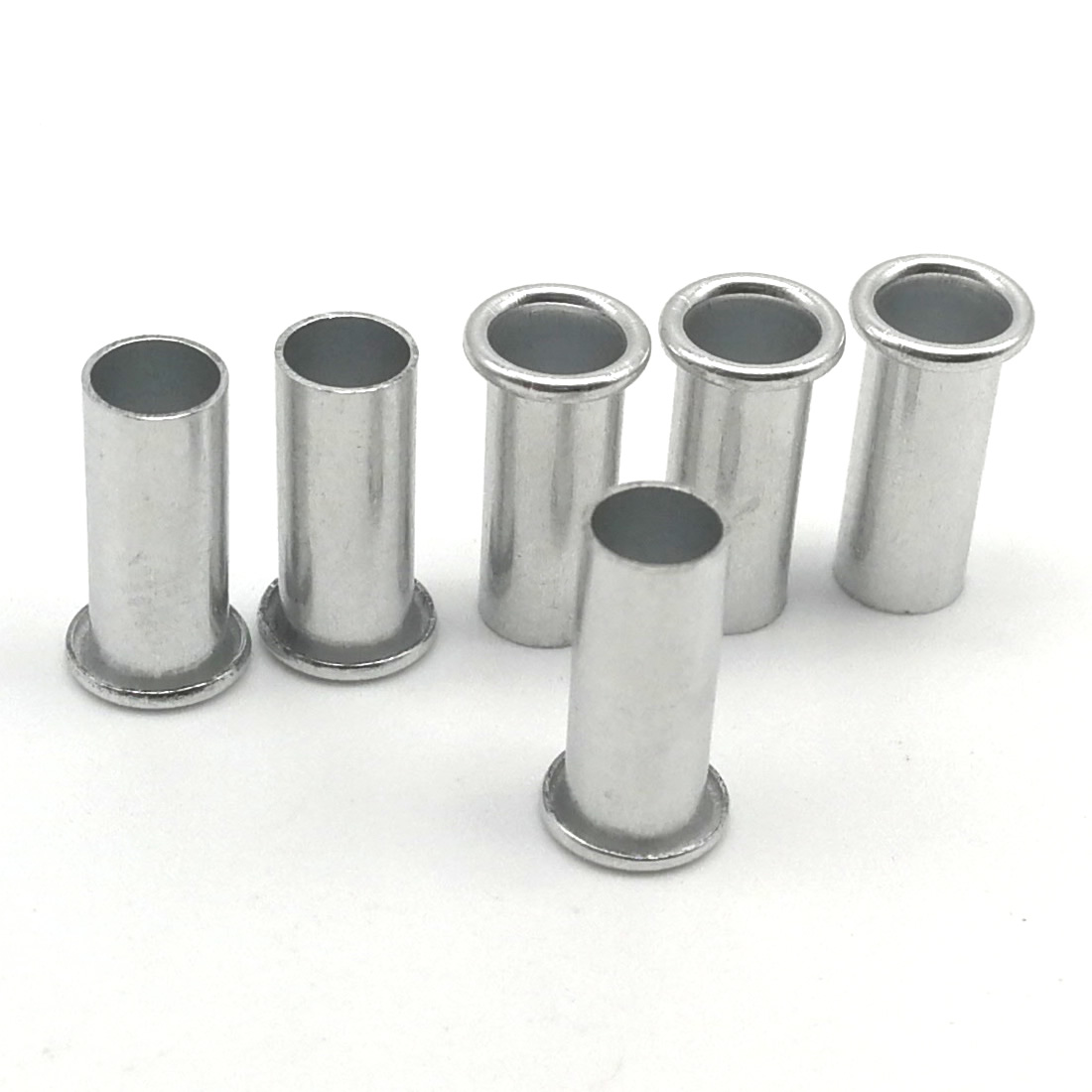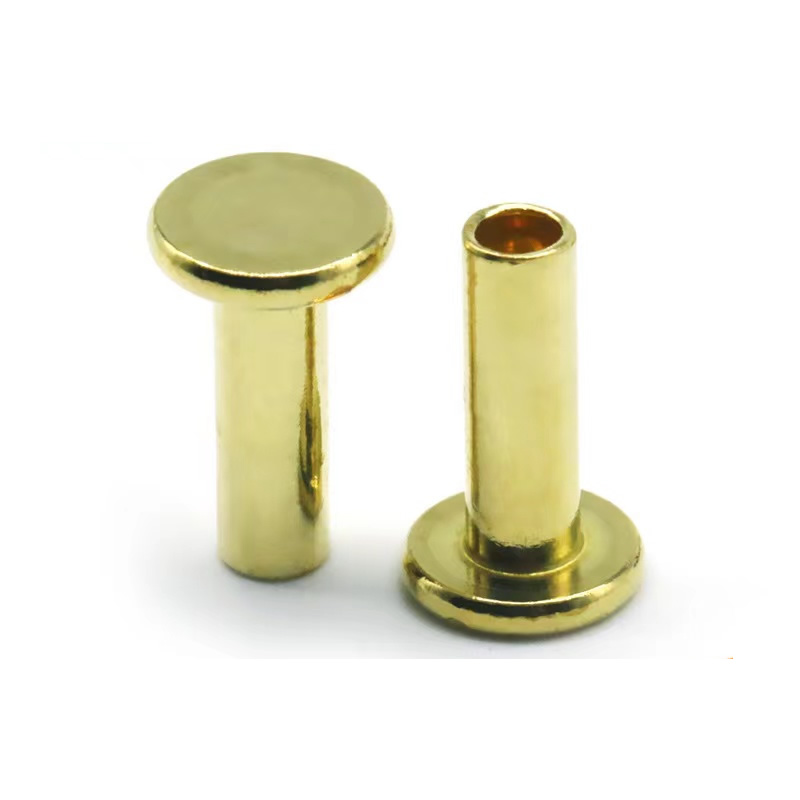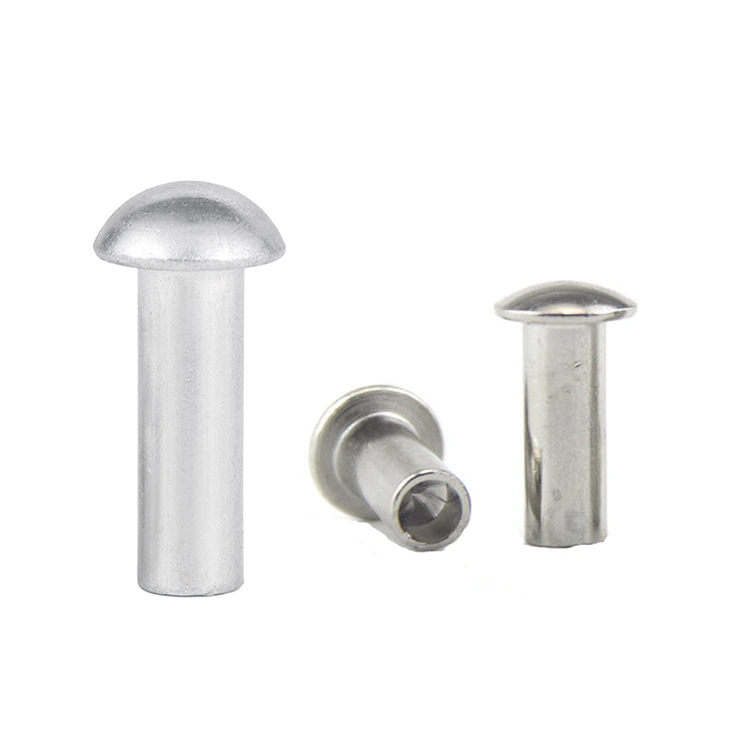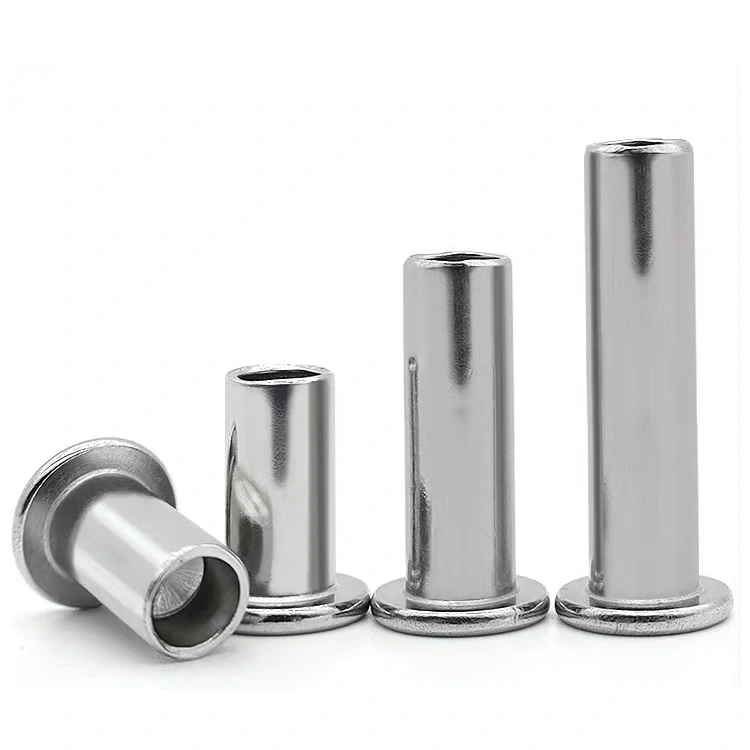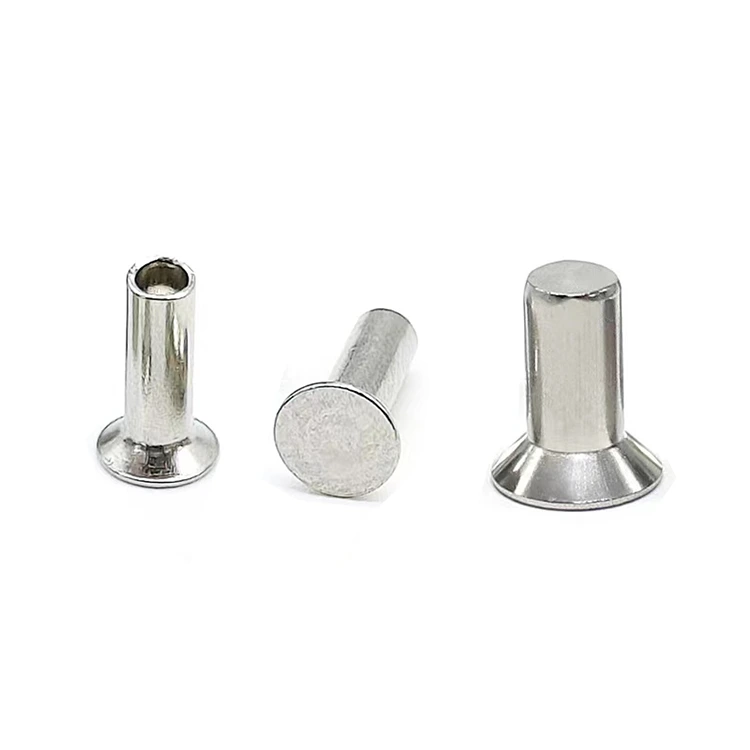Rivets
As one of professional manufacturer in China, Notin would like to provide you Rivets. And we will offer you the best after-sale service and timely delivery.
What is a rivet?
A rivet is a permanent mechanical fastener used to join two or more materials. Rivets work by inserting a metal pin into an aligned hole and deforming the end, creating a strong, secure, and durable connection. Unlike temporary fasteners like screws, rivets do not rely on threads, but instead form a permanent connection, making them ideal for applications requiring high strength, durability, and vibration resistance.
Classification of Rivets
Rivets are typically categorized by head shape, degree of hollowness, or material.
Based on head shape, rivets can be classified as flat head rivets, round head rivets, countersunk head rivets, mushroom head rivets, universal head rivets, truss head rivets, etc.

Based on degree of hollowness, rivets can be classified as solid rivets, semi-tubular rivets, or full tubular rivets.
Based on material, rivets can be classified as brass rivets, stainless steel rivets, steel rivets, aluminum rivets, copper rivets, etc.
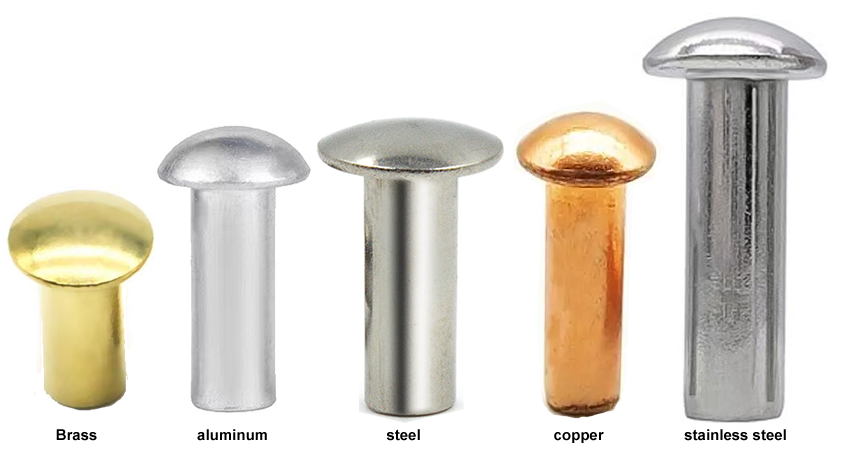
What surface finishes are available for rivets?
Rivet surfaces are typically treated with rust-proofing treatments, primarily electroplating, including zinc plating, nickel plating, chrome plating, tin plating, gold plating, and silver plating. Electroplating is a common rust-proofing method for rivets. It applies a layer of plating to the rivet surface through physical or chemical methods. The plating effectively prevents corrosion and rust, while also providing a certain aesthetic effect.
Another special surface treatment method is head coating. Head coating is performed after the rivet is electroplated. This allows for a variety of colors on the rivet head, achieving an aesthetically pleasing finish.
Aluminum rivets cannot be electroplated, but they can be anodized. Anodizing also allows for a variety of color options, but the unit price is higher than electroplating.
Rust-proofing the rivet surface is crucial, effectively extending the rivet's service life and ensuring a secure connection. Different rust-proofing methods are suitable for different environments and applications, so the choice should be tailored to the specific situation.
- View as
Rivets creux en aluminium
Les rivets creux en aluminium sont une fixation courante, ils sont largement utilisés dans de nombreux domaines en raison de leur légèreté, de leur résistance à la corrosion et de leur bonne conductivité électrique. Nuote Metals produit et vend des rivets creux en aluminium en Chine, nous avons plus de 10 ans d'expérience professionnelle dans ce secteur.
En savoir plusenvoyer une demandeRivets semi-creux en laiton
Chez Nuote Metals, nous nous concentrons sur la fabrication de rivets semi-creux en laiton. Nos rivets utilisent principalement du laiton H65, un mélange cuivre-zinc qui offre une excellente conductivité électrique et thermique, ainsi qu'une solide résistance à la corrosion. Ce matériau est à la fois suffisamment dur et suffisamment flexible pour bien fonctionner avec les processus de frappe à froid et de rivetage. De plus, le laiton a cette couleur dorée naturelle, donc si vous les utilisez à des fins décoratives, vous n'aurez souvent pas besoin de placage supplémentaire.
En savoir plusenvoyer une demandeRivets demi-creux à tête cylindrique
Vous êtes-vous déjà demandé comment sont fabriqués nos rivets demi-creux à tête cylindrique ? Voici un aperçu rapide :
Tout d’abord, nous sélectionnons le bon fil métallique et le coupons à la longueur exacte nécessaire. Ensuite, nous passons à la machine de frappe à froid, qui perce et façonne ce fil pour lui donner la forme de base du rivet – c'est là que la tête cylindrique et la tige creuse prennent réellement forme. La prochaine étape est le traitement thermique ; nous ajustons le temps et la température en fonction du matériau pour nous assurer que chaque rivet a la bonne résistance et la bonne ténacité. Après cela, nous ajoutons souvent une finition protectrice – pensez à la galvanisation ou à la passivation – pour les aider à lutter contre la rouille et à durer plus longtemps. Et nous ne sautons jamais la vérification finale : chaque lot est examiné pour confirmer que la taille, la finition et les performances sont conformes aux normes.
Nous sommes toujours heureux de faire visiter les lieux aux clients. Si jamais vous êtes dans la région, faites-le-nous savoir et nous organiserons une visite !
Rivets demi-creux à tête champignon
Les rivets demi-creux à tête champignon tirent leur nom de leur tête distincte en forme de dôme, qui ressemble un peu à un chapeau de champignon, combinée à une tige partiellement creuse. Cette conception permet au rivet de se façonner pendant l'installation, créant ainsi une tenue solide, parfaite pour les utilisations où vous avez besoin à la fois d'une belle apparence et de performances solides. Une fois réglée, l'extrémité creuse s'évase et s'agrippe fermement, tandis que la tête et la section supérieure de la tige restent solides pour un soutien supplémentaire.
En savoir plusenvoyer une demandeRivets demi-tubulaires en fer
Les rivets demi-tubulaires en fer sont des connecteurs mécaniques à queue creuse. Ils fonctionnent en pressant la partie creuse et en la bridant vers l'extérieur pour créer une fixation permanente par encliquetage. Les applications principales sont concentrées dans les industries légères telles que l'habillement, la chaussure et la bagagerie. Leur utilisation de matériaux métalliques souples évite les fissures lors des joints de rivets et offre des avantages en termes de coûts. Nuote Metals est un fabricant professionnel de rivets demi-tubulaires en fer. Nos rivets sont de haute qualité et chacun est soumis à une inspection approfondie pour garantir la satisfaction du client.
En savoir plusenvoyer une demandeRivets semi-creux à tête fraisée
Pourquoi choisir des rivets semi-creux à tête fraisée plutôt que d’autres méthodes de connexion ? Cela est principalement dû à leurs avantages uniques. Après l'installation, la tête affleure la surface, évitant ainsi les interférences potentielles ou les risques de sécurité causés par les saillies. La conception semi-creuse rend le processus de rivetage relativement simple, ne nécessitant aucun équipement complexe ; elle peut généralement être réalisée manuellement ou avec des outils pneumatiques. Ce type de rivet convient aux matériaux d'épaisseurs variables et peut être adapté à diverses situations en ajustant la force de rivetage.
En savoir plusenvoyer une demandeWhat are the advantages of rivets over other fasteners?
1. Ease of Installation
Rivets are fast to install, and even fully automated for high-volume applications, resulting in a simple and efficient operation process.
2. Connection Reliability
The riveting process is standardized, with strict quality control, resulting in highly stable connections. Visual inspection allows for quick verification of connection quality.
3. Vibration and Impact Resistance
Rivets connect through deformation or interference fit, providing strong clamping force and excellent vibration resistance, capable of withstanding vibration and shock.
4. Low Cost
Rivets are easy to install and can be fully automated, saving significant labor costs.
What are the advantages and disadvantages of rivets made of different materials?
Aluminum Rivets
Advantages: Lightweight, reduces overall product weight, low cost, suitable for general civilian applications.
Disadvantages: Low tensile and shear strength, unsuitable for high-strength workpieces, prone to electrochemical corrosion when in contact with metals such as stainless steel.
Stainless Steel Rivets
Advantages: Strong corrosion resistance, high hardness, suitable for high-strength workpieces (such as marine equipment)
Disadvantages: Higher cost, typically more expensive than aluminum rivets of the same specification.
Brass and Copper Rivets
Advantages: Excellent conductivity (such as connecting electronic components), good corrosion resistance.
Disadvantages: Higher cost, more difficult to process.
Steel Rivets
Advantages: High hardness, high connection reliability, and wide applicability.
Disadvantages: Compared to other materials, iron rivets are more prone to rusting.
What are the main applications of rivets?
Rivets have a wide range of uses, from small items like a pair of scissors to large items like airplanes and ships, as well as in high-precision medical applications.
Industrial Manufacturing
Rivets are used in a wide variety of industrial fields, wherever there is a need to connect two or more materials.
Electronics
Rivets secure heat sinks and chips, providing both vibration damping and noise reduction, and are widely used in the cooling systems of electronic products such as computers and mobile phones.
Automotive
Rivets are widely used to connect components of automobile bodies and chassis, such as doors and hoods. Their lightweight and corrosion-resistant properties make them an indispensable joining method in automotive manufacturing.
Aerospace
In aircraft manufacturing, rivets are used to connect different fuselage components, such as wings and tailplanes. Millions of rivets create high-strength, corrosion-resistant joints. Aluminum and titanium alloy rivets are often used to connect components of corresponding materials, ensuring stability in extreme environments.
Rivets are used everywhere. The above examples only represent a small number of their applications. We see rivets everywhere in our daily lives, such as on scissors, folding beds, and strollers etc. Rivets can be customized to different sizes and materials depending on the application.
Nuote Metals has specialized in the rivet industry for over a decade. Our factory is located in Dongguan, a city known as the "World Factory," a city with a developed industry and convenient transportation. This allows us to respond quickly when acquiring raw materials and supporting surface treatments, meeting our customers' needs for quick access to samples and bulk orders. We produce 10 million rivets daily and have molds of various specifications, allowing us to produce rivets as small as 0.8mm and as large as 10mm. We welcome your inquiries and visits.






